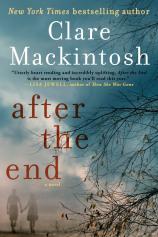After the End
Review
After the End
In the famous poem by Robert Frost, "The Road Not Taken," the speaker utters the words:
Two roads diverged in a yellow wood,
And sorry I could not travel both
What Clare Mackintosh does with the narrative of her latest novel, AFTER THE END, is to allow readers the opportunity to see what would happen if both roads were taken.
This is yet another complex and unpredictable decision by an author who already has shown that she will stop at nothing to keep her readers guessing due to the often less than paint-by-the-numbers narrative for which she has become known. In fact, her first novel, I LET YOU GO, featured what I thought was one of the most jaw-dropping, punch-in-the gut literary twists I have ever experienced. All three of her prior books, each first-rate psychological thrillers, took “the road less traveled,” and did not bend to standard protocol when telling a story or revealing something hidden right beneath the surface yet undetectable to her readers.
"AFTER THE END will not be easy to forget. Thankfully, Mackintosh has done through fiction writing what real life could not provide her --- the opportunity to see both choices and get the chance to live through each of them to their own ends."
AFTER THE END is a different type of novel. For one, it's not labeled a “psychological thriller.” This has to do mainly with the fact that the story is a sort of retelling of a personal tragedy she experienced in her own life. I can only hope that capturing those emotions on the written page provided her with some closure. If what she went through is anything close to what the young couple in this book faces, she is a hero just for being able to share her story with the rest of the world.
Twelve years prior to writing AFTER THE END, Mackintosh’s son became critically ill. She and her husband were asked to make a decision that would change all of their lives forever. It was this traumatic experience that was the impetus for what Max and Pip go through here. Max is American but living in the UK as he travels frequently for his company. Pip is British and seems to have everything; she is married to her best friend, and life is good. Their strong relationship is about to be tested, though, when Pip gives birth to their son.
The action begins with two-year-old Dylan, a current resident in the PICU (Pediatric Intensive Care Unit) of the same hospital in which he was born just a couple of years earlier. Guiding his care is an Iranian physician, Leila Khalili, who is doing everything she can for Dylan. Leila tells herself that Max and Pip are the strongest couple she has ever met --- which will become quite ironic as their marriage will be put in serious jeopardy. Dylan suffers from medulloblastoma, or pneumonitis, an incurable condition. The tests that are being done confirm that he is terminally ill, and it is just a matter of keeping him comfortable until he passes on.
When Leila presents that option to Max and Pip, she asks them to sleep on it and then reconvene the next day. The problem is that once the three of them all get together again, the parents are not on the same page. Pip wants to follow the doctor’s and hospital's recommendation of allowing Dylan to die with dignity. But Max has done research on Dylan's condition and knows of a clinic in the U.S. that can provide proton beam therapy, which has been known to have some level of success. Pip and Leila both feel that this would be the wrong thing to do for Dylan as the brain damage his condition has brought on would never allow him to live any type of life without being completely dependent on others to function.
It is here where things get ugly as Max moves out of the house to take an apartment closer to the hospital. He also hires an attorney to sue the hospital in order to get Dylan released to his care so they can travel to the U.S. for the treatment he researched. The court case is quite dramatic and gives readers enough insight into both sides of the argument. Whatever happens, the decision will be heartwrenching, and similar to couples who have suffered the loss of a child, it could possibly count their marriage as another casualty of these tragic circumstances.
Since this is a Clare Mackintosh novel, readers should be prepared for anything. The story is told in chapters coming from the perspectives of Max, Pip and Leila. However, following the case and the judge's decision, Mackintosh takes things into the “After” mode. It is here where the book’s second half splits and takes both roads offered, as we get to see what would transpire from each decision. It is a novel turned inside out and with a narrative twisted up with it.
AFTER THE END will not be easy to forget. Thankfully, Mackintosh has done through fiction writing what real life could not provide her --- the opportunity to see both choices and get the chance to live through each of them to their own ends.
Reviewed by Ray Palen on June 28, 2019
After the End
- Publication Date: June 16, 2020
- Genres: Fiction, Women's Fiction
- Paperback: 416 pages
- Publisher: G.P. Putnam's Sons
- ISBN-10: 0451490576
- ISBN-13: 9780451490575




